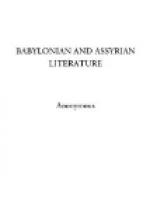[Footnote 5: The public sale herein described is taken from the statement of Herodotus (see Herodotus, vol. i., p. 196. Compare “Nic. Dam. Fr.,” 131, and AElian. “Var. Hist.,” iv. 1), who says all the marriageable virgins in all the towns of the empire or kingdom were sold at public auction. The beautiful maidens were sold to the highest bidder, and the proceeds were deposited before the herald. The ugly maidens in turn were then put up, and the bidders were called upon to take them as wives with the smallest dowry to be paid from the proceeds of the sales of the beautiful maids, and they were in turn awarded to those who would accept them with the smallest amount as dowry. The numerous contracts for the sales of women now in the British Museum may possibly be records of these transactions.]
[Footnote 6: “Sab-at-tu,” a day of rest for the heart ("W.A.I.,” ii. 32), the Sabbath day, which was dedicated to the worship of the sun, moon, and stars, and their gods, which were known by different names.]
[Footnote 7: “Lain,” to lay, v.a. (pretr. “laid,” part, passive “lain,” from “liggan,” Sax.), “to place along the ground.”—Fenning’s Royal Eng. Dic., London, MDCLXXV.]
[Footnote 8: From the Babylonian Festival Calendar ("C.I.W.A.,” vol. iv., pls. 32, 33); also translated in “Records of the Past,” vol. vii., pp. 162, 163.]
[Footnote 9: “Zubat,” robes.]
[Footnote 10: “Ku-bar-ra,” linen robes.]
[Footnote 11: “And two golden talents!”]
[Footnote 12: “Three talents!”]
[Footnote 13: “Fifteen!”]
[Footnote 14: “Twenty!”]
[Footnote 15: “And thirty!”]
[Footnote 16: “And forty!”]
[Footnote 17: “Fifty!”]
[Footnote 18: “One hundred!”]
[Footnote 19: “One thousand!”]
[Footnote 20: “Five bilti,” about L3,165 sterling, or $15,825.]
COLUMN II
COUNCIL IN THE PALACE
The seers on silver couches round the throne;
The hangings of the carved lintel thrown
Aside; the heralds cried: “The Sar!
The Sar!
The council opens our King Izdubar!”
The Sar walked o’er the velvets to his throne
Of gold inlaid with gems. A vassal prone
Before the Sar now placed the stool of gold,
Arranged his royal robes with glittering fold
Of laces, fringes rich inwove with pearls,
Embroidered with quaint figures, curious twirls.
Behind the throne a prince of royal blood
Arrayed in courtly splendor, waiting stood,
And gently waved a jewelled fan aloft
Above the Sar’s tiara; carpets soft
From Accad’s looms the varied tilings bright,
In tasteful order, part conceal from sight.




